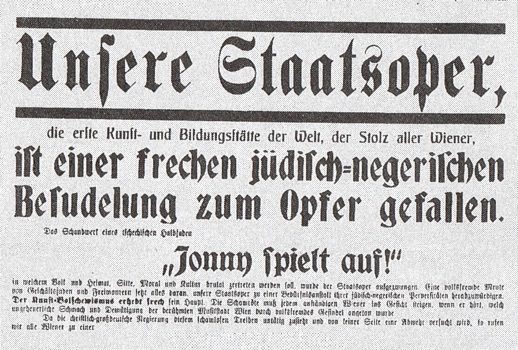
Jonny’s success was so widespread that its Wiener Staatsoper premiere knocked Die Fledermaus off the schedule for New Year’s Eve in 1927. In New York, the Met gave it seven performances (two with Lawrence Tibbett in the title role), a box office success which scandalized the local critics, but unfortunately a mere six months before the great stock market crash of 1929 diminished tastes for such frothy, escapist entertainment.
In Wien, the opera was given 33 times through April 1931 (with Alfred Jerger performing Jonny in the majority of performances), even while National Socialist factions denounced the work which to them celebrated the excesses of the Weimar Era: famous photos show swastika-adorned posters begging citizens to protest performances at “unsere Staatsoper.”
The opera was banned as the Nazis rose to power, and in 1938 Jonny spielt auf was included in the famous exhibition of works deemed Entartete Musik (Degenerate Music) due to the lead character’s being not only a jazz musician, but a black one at that. Krenek was even denounced as a Jew despite having no Jewish ancestry.
After World War II, Jonny seemed inappropriate in so many ways: with it, K?enek invented something entirely new: the Zeitoper, an opera written for its specific time. The composer himself (who lived and worked into his 90s spending his last decades as a resident of Palm Springs) doubted if Jonny could still be pertinent so many years later, in such a changed world.
Most importantly, Jonny had been sung by white baritones in blackface, a practice which was quite common in vaudeville in the 1920s typified by Al Jolson; after the war, this controversial practice lost favor. Eyeballs rolled when Joan Crawford smeared on Max Factor’s “Light Egyptian” for the now-notorious “Two-Faced Woman” production number in her 1953 MGM musical Torch Song, her first film in Technicolor. In the era before black singers were accepted into the world’s opera houses, how could Jonny be produced?
In my teens, I acquired an LP of a 50-minute abridged version of the opera starring Evelyn Lear (Anita), William Blaneknship (Max), Gerd Feldhof (Jonny), Thomas Stewart (Daniello), and Lucia Popp (Yvonne) with the orchestra of Wiener Staatsoper (it remains available on CD on the Vanguard label). I fell in love with it in its truncated form so much that I acquired a first edition of the piano-vocal score to ferret out the rest of the work. It would take until Decca launched its series of recordings of Entartete Musik in the 1990s for a complete recording of Jonny to appear, which features black baritone Krister St Hill as Jonny, along with Alessandra Marc as Anita.
When Seiji Ozawa was named Music Director of Wiener Staatsoper in 2002, his first premiere was announced as Jonny spielt auf in a new production by Günter Krämer, the opening night of which serves as this week’s Mixcloud upload with a cast including Nancy Gustafson, Torsten Kerl, Bo Skovhus, Peter Weber, and Ildikó Raimondi. The production ran for 14 performances over two seasons and failed to meet expectations as the much-hyped, hoped-for success it had been when first announced.
Despite the jazzy score, scantily-clad Las Vegas-style showgirls invading the auditorium to perform kick lines, an onstage car chase and a moving locomotive, it was Krämer’s approach to the character of Jonny that doomed the production: Skovhus was not just given some dark makeup in the tradition of Otello, but slathered in grotesque jet black greasepaint and topped with a large, cartoonish Afro wig.
I was simply aghast. Friends and colleagues to whom I sent production photos all reacted negatively, from outrage (by a Chinese pianist) to disgusted disbelief (by a lesbian novelist) to gallows-humor irony (by a black photographer).
I have only been able to find one staged production in which Jonny is actually performed by a black singer, in a YouTube clip promoting a production at the Salzburger Landestheater from 2013: (https://www.youtube.com/watch?v=mHNrvAuQc18).
All of this adds fuel to recent Parterre fire about racism and misogyny in works such as Die Entführung aus dem Serail, Così fan tutte, Die Zauberflöte, and the entire Wagner canon.
The original score—as well as the cast list in the program from the 2002 Staatsoper performance I attended—precedes each character’s name with a descriptive noun: “The Singer Anita,” “The Composer Max,” “The Violinist Daniello,” “The Chambermaid Yvonne.” Preceding the name “Jonny” is a noun beginning with the letter “N” (which I have deleted from the cast list for this upload). I have also decided against publishing a photo of Skovhus as Jonny. You can find it easily enough on Google Images (as well as one of Tibbett in the role), but be forewarned that it is extraordinarily offensive.
Over the last year I have read about the Met deciding to do away with its policy of putting tenors in blackface for Otello, the Pennsylvania Governor’s Advisory Commission on Asian Pacific American Affairs lodging a complaint with the Opera Company of Philadelphia over the portrayal of Chinese characters in a production of Turandot (some changes were made), and the New York Gilbert & Sullivan Players cancelling a production of The Mikado, deeming the work racially-insensitive after the plans came under attack on social media. Have we become too politically-correct?
This also raises the question: can Jonny spielt auf still be relevant in the 21st century, and if so, how can it best be presented?
Ernst Krenek: Jonny Spielt Auf
Wiener Staatsoper
Seiji Ozawa, conductor
16 December 2002
Der Komponist Max – Torsten Kerl
Die Sängerin Anita – Nancy Gustafson
Jonny – Bo Skovhus
Der Violinvirtuose Daniello – Peter Weber
Das Stubenmädchen Yvonne – Ildikó Raimondi
Der Manager – Wolfgang Bankl
Der Hoteldirektor – John Dickie
Ein Bahnangestellter – Konrad Huber
1. Polizist – Benedikt Kobel
2. Polizist – Marcus Pelz
3. Polizist – Peter Köves


